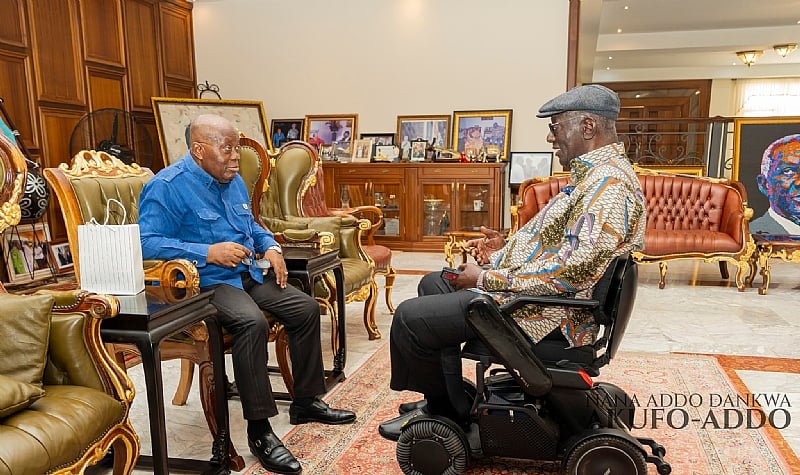The Easter season of 2024 witnessed a significant display of camaraderie and respect between two prominent figures of Ghana’s Fourth Republic, former Presidents Nana Addo Dankwa Akufo-Addo and John Agyekum Kufuor. Akufo-Addo, in a gesture laden with symbolism, paid a visit to his predecessor, highlighting the enduring bond between them and underscoring the importance of unity within the nation’s political landscape. This meeting transcended the typical formalities often associated with political figures, revealing a genuine warmth and mutual admiration that resonated deeply with the Ghanaian populace. Akufo-Addo publicly shared his experience, referring to Kufuor as his “boss,” a term of endearment that speaks volumes about the respect he holds for the former president and acknowledging the influence Kufuor had on his own political journey. This public acknowledgement further solidified the perception of a positive and respectful relationship between the two leaders.
The Easter visit held particular significance, occurring during a period traditionally associated with reflection, renewal, and hope. It provided a powerful message of continuity and unity, demonstrating that despite the changes inherent in political transitions, a shared commitment to the nation’s well-being can and should prevail. The image of these two influential figures together fostered a sense of stability and harmony, offering reassurance to the citizenry and sending a clear message that political differences need not translate into personal animosity. This message was particularly potent during the Easter period, a time when themes of reconciliation and forgiveness are at the forefront. By choosing this specific moment for his visit, Akufo-Addo amplified the message of unity and collaboration, suggesting a shared vision for the future of Ghana, irrespective of individual political affiliations.
The public reaction to the meeting was overwhelmingly positive, with many Ghanaians expressing their appreciation for the display of unity. The timing of the visit, coinciding with the Easter celebrations, further amplified its impact. Easter, a period symbolizing hope and renewal, provided the perfect backdrop for this demonstration of political maturity and mutual respect. The gesture resonated with the spirit of the season, emphasizing the importance of reconciliation and togetherness, not just within families and communities, but also within the political sphere. It underscored the idea that despite differing political viewpoints, a shared national identity and purpose can and should bind leaders together.
This positive reception reflected a yearning among the Ghanaian people for a more collaborative and less divisive political environment. The visit served as a reassuring reminder that political leadership can transcend partisan lines and prioritize the common good. This display of unity offered a refreshing counterpoint to the often-polarized nature of political discourse, demonstrating that respect and cooperation are not only possible but essential for the nation’s progress. The widely shared images of the meeting became a symbol of hope for a more unified and harmonious political future.
The meeting between Akufo-Addo and Kufuor can be interpreted as a powerful symbol of democratic maturity within Ghana. It showcased the smooth transition of power and the respect for the established democratic processes, reinforcing the strength of the nation’s institutions. This gesture was not merely a personal act of courtesy but a public affirmation of the principle of peaceful transfer of power, a cornerstone of any successful democracy. It served as a reminder that political office is temporary, but the commitment to serving the nation should endure beyond individual terms in office. This demonstration of respect for democratic processes further strengthens Ghana’s image on the global stage, showcasing its commitment to peaceful political transitions.
In conclusion, the Easter visit by former President Akufo-Addo to former President Kufuor was more than just a social call; it was a symbolic act with significant political and social implications. It was a testament to the maturity of Ghana’s democracy, a beacon of hope for national unity, and a powerful reminder that respect and collaboration are essential for the nation’s progress. The overwhelmingly positive public response further solidified the significance of the gesture, highlighting the public’s desire for a more unified and harmonious political landscape. This event will likely be remembered as a significant moment in Ghana’s political history, serving as a model for future transitions and emphasizing the importance of unity and respect in leadership.














